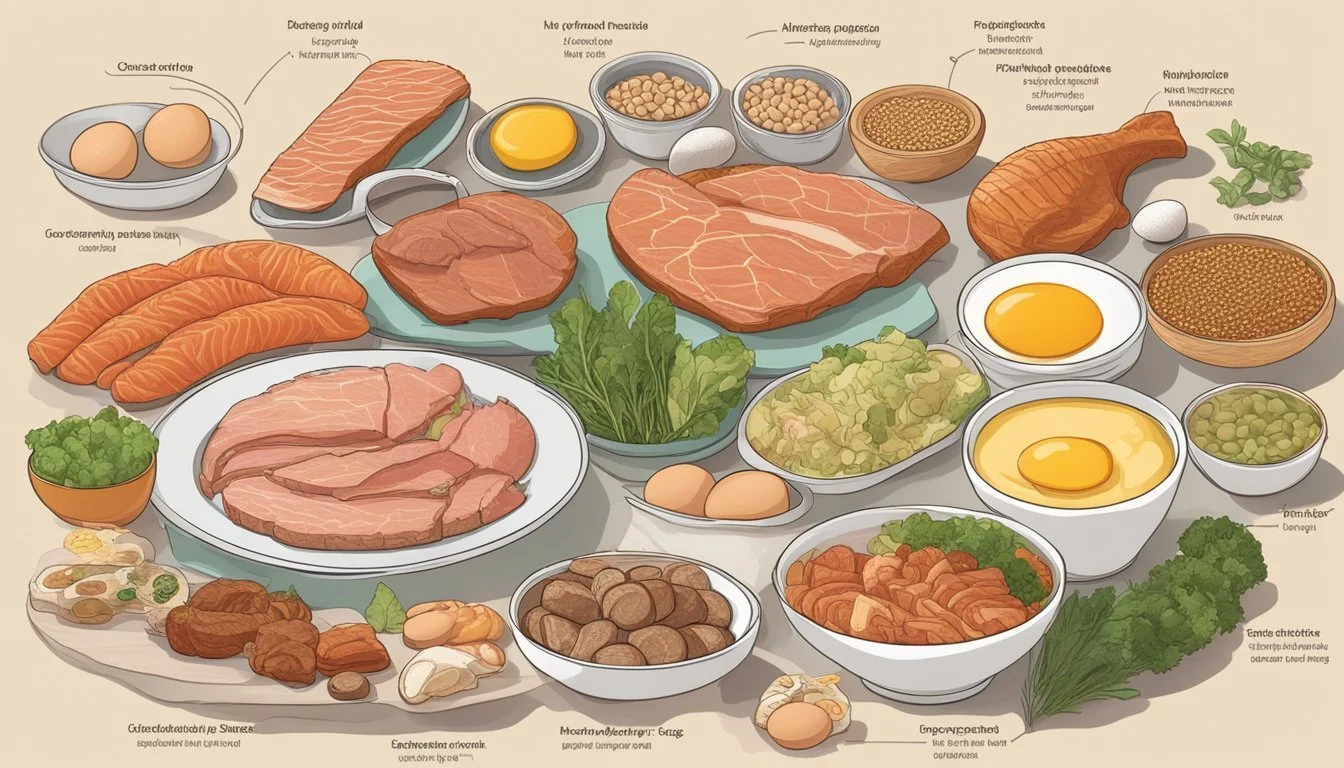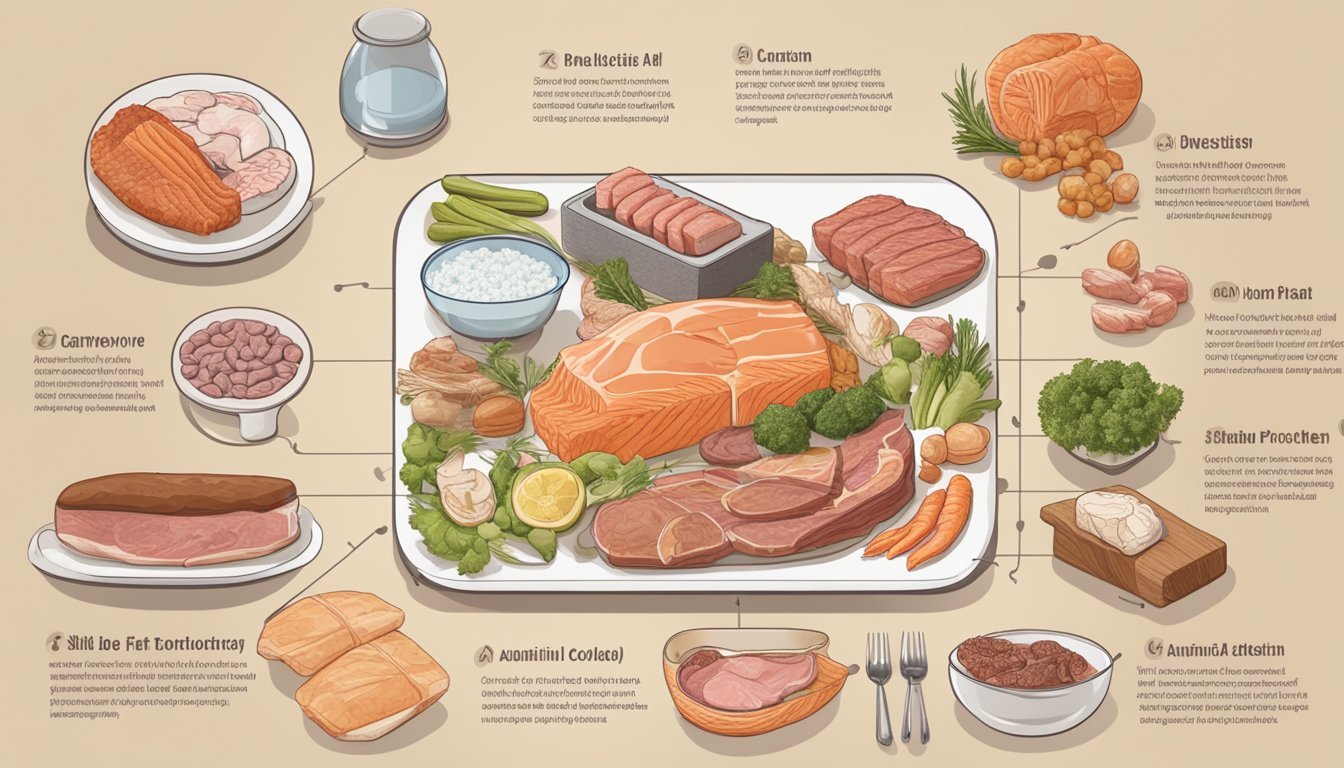The Carnivore Diet for People with IBS
Evaluating Digestive Health Impacts
Irritable Bowel Syndrome (IBS) affects a significant portion of the population, leading to symptoms such as abdominal pain, bloating, and altered bowel habits. The condition's management often centers on dietary adjustments, as the relationship between food intake and symptomatology is well-recognized. One dietary approach that has gained attention for its potential benefits is the carnivore diet, which emphasizes the consumption of animal products while eliminating plant-based foods.
Dietitians and healthcare professionals typically guide IBS patients through a variety of nutritional strategies tailored to individual needs. The carnivore diet's focus on meat and animal products is based on the premise that these foods are lower in fiber and viewed by some as easier to digest. This reduction in fiber is thought to lessen digestive burden, possibly resulting in fewer IBS symptoms for some individuals.
However, a wholly carnivorous diet departs significantly from the diverse, fiber-rich diets traditionally recommended by experts. Healthcare professionals might express concerns regarding the long-term effects, such as gut microbiome diversity and nutrient sufficiency. Thus, the adoption of a carnivore diet for those with IBS requires careful consideration of both the potential alleviation of symptoms and the overarching nutritional implications. It is crucial for individuals interested in this diet to consult with healthcare professionals to ensure a well-informed and safe approach to managing their IBS.
Understanding IBS
Irritable Bowel Syndrome (IBS) represents a significant challenge in digestive health, characterized by a set of symptoms that can affect quality of life.
Defining IBS and Symptoms
IBS is a chronic gastrointestinal condition with a worldwide prevalence of approximately 14%. It can be diagnosed using the Rome IV criteria, which focus on recurring abdominal pain and changes in bowel habits. Common symptoms include:
Abdominal pain
Bloating
Gas
Diarrhea or constipation, sometimes alternating
Common Triggers and IBS Management
Managing IBS often involves identifying and avoiding triggers. These can vary widely among individuals but often include:
Foods high in FODMAPs: Fermentable Oligo-, Di-, Mono-saccharides, and Polyols, which can exacerbate symptoms.
Stress: Psychological stress can significantly impact the severity of IBS symptoms.
Effective IBS management typically combines dietary adjustments with stress-reduction techniques.
Basics of the Carnivore Diet
This section examines the fundamental principles of the carnivore diet, highlighting its dietary structure, potential health implications, and key factors to consider especially for individuals with IBS.
Overview of Carnivore Diet
The carnivore diet is characterized by the exclusive consumption of animal products. Proponents consume a range of foods that include meat, eggs, and select dairy products, completely omitting plant-based foods. This diet is high in protein and fat, particularly saturated fat, while devoid of carbohydrates.
Potential Benefits
Followers of the carnivore diet report improved digestion and reductions in symptoms associated with inflammatory conditions. The diet is said to simplify eating by focusing on nutrient-dense animal products that are rich in vitamins and minerals that the body requires.
Challenges and Considerations
Despite potential benefits, this diet raises several concerns. It lacks fiber, essential for gut health, and can limit nutrient variety, possibly affecting the gut microbiome. There's also the consideration of the high intake of saturated fat, which has been linked to heart disease, although this link is sometimes debated within the scientific community. It's crucial for individuals with IBS to consider these factors, as dietary changes can significantly impact their condition.
Nutritional Profile of a Carnivore Diet
A carnivore diet, focused solely on animal products, provides ample proteins and fats while presenting challenges in obtaining a complete range of vitamins and essential nutrients. This dietary approach may require careful planning to avoid nutrient deficiencies.
Proteins and Fats
The centerpiece of the carnivore diet is its high concentration of proteins and fats. Proteins are abundant since meat is an excellent source of all essential amino acids necessary for the body’s functions. Fats, particularly saturated and monounsaturated fats, are also consumed in high amounts, coming from sources like red meat and animal fat. This diet typically excludes carbohydrates, relying on the metabolic state of ketosis for energy.
Proteins:
Red meat: rich in essential amino acids
Poultry: provides complete protein
Fish: contains protein and omega-3 fatty acids
Fats:
Lard, tallow: high in saturated fat
Butter, ghee: sources of monounsaturated fat
Eggs: contain healthy fats and cholesterol
When it comes to getting the best deals, buying lard, tallow, or ghee online is the way to go!
Vitamins and Essential Nutrients
Animal products, particularly organ meats like liver, can be rich in vitamins and essential nutrients. The liver, for instance, is a powerhouse of nutrients, packed with vitamins A, D, E, and K. It also contains vital minerals such as iron and copper. However, relying solely on muscle meats may lead to deficiencies, particularly in vitamins C and E and some B-vitamins. Thus, inclusion of a variety of organ meats is crucial for a more complete nutrient profile.
Vitamins and Minerals in Organ Meats:
Liver: high in vitamin A, B vitamins, iron, and copper
Kidney: source of riboflavin and B12
Heart: rich in CoQ10 and vitamin B12
Essential Nutrients Often Lacking:
Vitamin C: typically found in fruits and vegetables
Fiber: absent in animal products, necessary for digestive health
Calcium: limited in a carnivore diet without bones or dairy
The inclusion of varied animal-derived foods, like the fatty fish, eggs, and organ meats, might help mitigate the risk of deficiencies, but supplementation and dietary diversity should be considered to ensure a comprehensive intake of all essential nutrients.
Carnivore Diet and IBS
The carnivore diet has been presented as a dietary approach with potential benefits for individuals with Irritable Bowel Syndrome (IBS), potentially impacting symptoms such as bloating, gas, and abdominal pain.
How the Diet Affects IBS
Symptom Relief: The carnivore diet, by eliminating plant-based foods, may reduce digestive symptoms like gas, bloating, and diarrhea for some individuals. It operates on the premise that solely consuming meat and animal products could lessen the digestive burden, easing symptoms such as cramping and abdominal pain. IBS sufferers sometimes report improvement after starting a carnivore diet, though these anecdotal evidence's scientific underpinnings warrant scrutiny.
Gas and Bloating: Instances of gas and bloating may decrease due to the absence of fermentable carbohydrates.
Diarrhea and Constipation: Some individuals may experience a reduction in diarrhea due to the low fiber content, whereas others may find constipation to be a challenge.
Digestive Disorders: It is crucial to acknowledge that IBS is a complex group of digestive disorders, and while some may find relief with the carnivore diet, others may not.
Digestive Considerations
Upon adopting the carnivore diet, a person with IBS may notice changes:
Fiber Intake: A significant concern relates to the elimination of dietary fiber, known for its role in digestion and stool formation. This could aggravate constipation or, paradoxically, in some cases, alleviate diarrhea.
Gut Microbiome: The long-term impact on the gut microbiome due to the diet's reduction in diversity is uncertain. A diverse microbiome is typically associated with better digestive health.
It is essential for anyone considering the carnivore diet for IBS to consult with a healthcare professional to ensure that it is appropriate for their specific health needs and to monitor any changes in their symptoms.
Food Selections on the Carnivore Diet
In the carnivore diet, individuals looking to manage IBS symptoms must be selective with their food sources, focusing on high-quality meats and appropriate dairy and egg intake to ensure adequate nutrition while adhering to the diet's strict guidelines.
Meat Choices
Beef: A staple in the carnivore diet, beef provides essential nutrients such as protein, B vitamins, and minerals. Grass-fed and finished beef is preferred for its higher omega-3 content and leaner fat profile.
Poultry: Chicken and turkey are acceptable lean meat options, offering varied cuts from breast to thigh that provide a good source of protein. The skin can be consumed for added fat.
Pork: Pork products, ranging from chops to bacon, can be included but should be consumed in moderation due to the higher fat content, which may affect digestive sensitivity.
Lamb: Lamb is another nutritious meat choice, known for its rich flavor and high vitamin B12 content. It can serve as a rotating option to provide dietary variety.
Seafood: A variety of seafood, including fish like salmon, is encouraged due to its high omega-3 fatty acids, which are beneficial for overall health. Shellfish, being rich in nutrients like zinc, makes a valuable addition.
Dairy and Egg Considerations
Eggs: Eggs are highly nutritious, containing essential amino acids and fats. They are a versatile part of the diet, easily included in many meals as a primary or complementary protein source.
Dairy: Dairy products can be integrated into the carnivore diet but should be chosen carefully:
Cheese: Opt for hard cheeses which tend to be lower in lactose. Aged cheddar and Parmesan are popular choices.
Butter: Grass-fed butter is a good source of fat-soluble vitamins and should be incorporated for cooking and flavor enhancement.
Heavy Cream: Limited amounts of heavy cream are sometimes used in coffee or for cooking, however, lactose content may be a concern for some individuals with IBS.
Those adhering to a carnivore diet should monitor their individual tolerance to dairy products to prevent any potential exacerbation of IBS symptoms.
Eliminating Plant-Based Foods
In the context of a carnivore diet for individuals with Irritable Bowel Syndrome (IBS), the elimination of plant-based foods can lead to significant changes in digestive health, particularly related to fiber content and the composition of gut flora.
Fiber and Digestive Health
Fiber, predominantly found in vegetables, fruits, legumes, and grains, has a well-established role in supporting digestive health. It helps to regulate bowel movements and is essential for maintaining a healthy digestive tract. On a carnivore diet, the complete removal of plant-based foods results in the absence of dietary fiber, which could affect bowel regularity and stool formation.
Fiber Intake Considerations:
Sources: Normally obtained from plant-based foods
Functions: Supports bowel regularity, aids in waste elimination
Carnivore Diet: No intake of fiber; may lead to changes in bowel habits
Potential Impact on Gut Flora
The gut flora, composed of diverse populations of gut bacteria, plays a crucial role in gut health. A varied diet that includes plant-based foods can contribute to a rich gut microbiome, benefiting overall health. Eliminating these foods can decrease microbial diversity due to the absence of fiber and other plant compounds that serve as prebiotics.
Gut Health Factors:
Diversity: Plant-based foods contribute to bacterial diversity
Plant Toxins: Compounds that may irritate the gut are removed
Microbiome Changes: Restriction to animal products alters the gut ecosystem
Eliminating plant-based foods within a carnivore approach simplifies the diet but also removes dietary components that are foundational to traditional views of a balanced gut environment.
Addressing Common Concerns
In considering the carnivore diet for individuals with IBS, it's important to weigh the potential digestive benefits against common concerns such as weight and heart health management and reactions related to food allergies and intolerances.
Weight and Heart Health
The carnivore diet eliminates plant-based foods, which in turn may reduce dietary fiber and certain vitamins from one's diet but can lead to weight loss due to reduced carbohydrate intake. However, a diet high in meat and animal products can potentially raise concerns about heart disease, especially if it results in high intake of saturated fats, which may impact cholesterol levels. Individuals should have their health monitored regularly by healthcare providers to check for any adverse changes in weight and cardiovascular health metrics.
Allergies and Food Intolerances
One of the diet’s touted benefits is the elimination of common allergens found in plant-based foods, such as gluten and lactose, which may be beneficial for people with related intolerances or sensitivities. However, individuals must ensure they are not allergic to certain animal products included in the carnivore diet. Maintaining a nutritionally balanced eating pattern on a carnivore diet can be challenging, and special attention should be paid to avoiding nutritional deficiencies that can result from a lack of variety in diet, which might exacerbate gastrointestinal disorders.
Lifestyle and Dietary Adjustments
Making lifestyle and dietary changes can have a significant impact on managing Irritable Bowel Syndrome (IBS). Careful meal planning and consultation with healthcare professionals are crucial steps in tailoring a diet that can potentially alleviate IBS symptoms.
Meal Planning for IBS
When an individual with IBS starts a carnivore diet, meal planning becomes essential. It is recommended to create a 7-day meal plan that includes a variety of meats and animal products to maintain nutritional balance. Here is an example framework for a meal plan:
Day 1
Breakfast: Scrambled eggs
Lunch: Grilled chicken breast
Dinner: Beef tenderloin (What wine goes well with beef tenderloin?)
Day 2
Breakfast: Beef liver
Lunch: Baked salmon
Dinner: Pork chops (What wine goes well with pork chops?)
Each meal should be spaced out adequately to allow for proper digestion and to minimize the risk of triggering IBS symptoms.
Consulting Professionals
Before an individual with IBS makes significant dietary changes, such as transitioning to a carnivore diet, it is important to consult with a dietitian or nutritionist. These professionals can provide guidance on:
Ensuring nutritional adequacy while eliminating high FODMAP foods known to exacerbate IBS.
Tailoring a low FODMAP diet plan that aligns with the principles of a carnivore diet if complete elimination of plant-based foods is not advised.
Dietary changes should be monitored by professionals to ensure they meet an individual's health needs while aiming to improve IBS symptoms.
Considerations for Long-Term Health
When adopting the Carnivore Diet for managing IBS, individuals must consider the potential implications on long-term health. It is crucial to engage with healthcare professionals to closely monitor vital signs and adhere to evolving dietary guidelines to ensure the intake of essential nutrients and maintain overall health.
Monitoring Vital Signs
Regular monitoring of vital signs, including blood pressure, heart rate, and blood panel markers, is advised. Individuals on the Carnivore Diet should work with a healthcare professional to monitor for potential nutrient deficiencies and to adjust the diet as needed to maintain nutritional balance. Frequent checks can help in identifying any issues early, such as:
Imbalances in electrolytes
Alterations in lipid profiles
Changes in blood glucose levels
Evolution of Dietary Guidelines
Dietary guidelines evolve based on new evidence and research findings. Healthcare professionals recommend a diet inclusive of a variety of food groups to provide essential nutrients critical for long-term health and immune system support. Therefore, they may advise incorporating certain plant-based foods or supplements to address nutrient shortfalls. The Carnivore Diet may necessitate adjustments over time, including potential interactions with medications, to ensure that nutritional needs are met and to reduce the risk of chronic diseases.
Conclusion
The carnivore diet has been proposed as a method to address Irritable Bowel Syndrome (IBS), focusing on a high intake of animal products. Advocates suggest that its simplicity may ease the digestive process for those with IBS. However, patients should seek guidance from a healthcare professional before making dietary changes, as individual needs can vary greatly.
Benefits cited for the carnivore diet in the context of gut health:
Low fiber content may reduce digestive stress.
Simplicity of the diet could potentially limit triggers for IBS.
Considerations to discuss with a healthcare professional:
Impact on gut microbiome diversity.
Long-term effects on overall health.
Nutritional completeness and the need for supplements.
Individuals with IBS should approach the carnivore diet carefully, as it constitutes a significant deviation from conventional dietary recommendations. It is essential to monitor symptoms and overall health closely should one decide to proceed with such a restrictive diet. Longitudinal studies and patient-specific outcomes will shed more light on the efficacy and safety of the carnivore diet for managing IBS.










